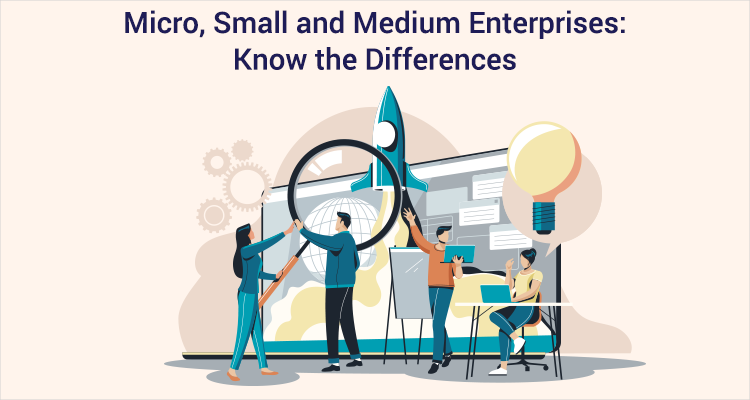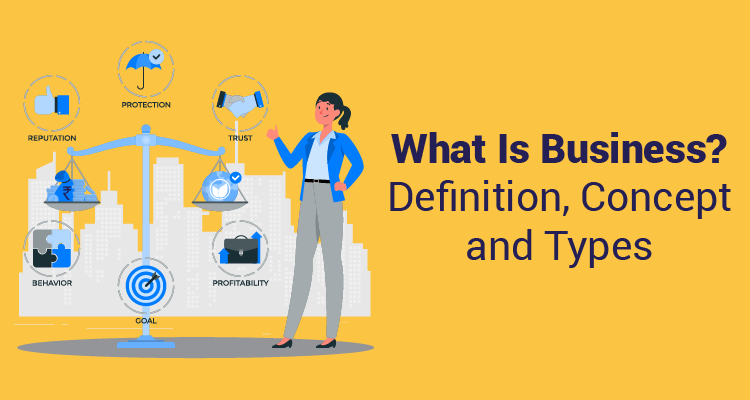Micro, Small and Medium Enterprises (MSME): Meaning & Differences
Table of Contents
Micro, Small, and Medium Enterprises (MSMEs) play a crucial role in the country's socioeconomic growth. Besides creating employment opportunities, they also contribute to developing the nation's remote regions.
Despite this, many people are still unsure about the differences between Micro, Small, and Medium Enterprises. The following article highlights the distinction between the three types of enterprises.
What Are Micro, Small and Medium Enterprises (MSME)?
MSME is an acronym for Micro, Small, and Medium Enterprises. According to the MSMED Act of 2006 by the Government of India, MSMEs are enterprises that process, produce, and preserve products.
The ministry has, however, removed the distinction between manufacturing-based MSMEs and service-based MSMEs in the 2020 revision of the Micro Small and Medium Enterprises Act.
Classification of MSMEs in India
1. Micro Enterprises
According to the revised MSME definitions released by India's finance ministry (with effect from 01.07.2020), Micro Enterprises are small companies with investments up to 1 crore and turnovers under 5 crores.
Micro enterprises vary from small cafes to local grocery stores to ice cream parlours. Small businesses like these typically start with little capital and have fewer than ten employees.
2. Small Enterprise
The income cap for small enterprises is between one and ten crores, and the turnover cap is up to 50 crores. The workforce is small and has a low sales volume.
Small Businesses can range from well-performing restaurants to manufacturing plants and bakeries. The average number of employees for small enterprises exceeds that of micro-enterprises.
Sapna aapka. Business Loan Humara.
Apply Now
3. Medium Enterprises
Businesses with an investment of up to 50 crores and a turnover between 50 and 250 crores are considered medium-sized enterprises. They typically employ 200-250 people on average. Generally, medium enterprises are micro and small-sized businesses that have grown steadily over time.
As a small business grows and expands, it spends its revenue on equipment, buildings, and employee retention, transforming it into a medium business.
Difference between SME and MSME
While the terms MSME and SME are often used interchangeably, there is a subtle difference between SME and MSME, primarily in their scope and origin.
MSME (Micro, Small and Medium Enterprise):
Specific to India: This term is used in India to categorize businesses based on their investment in plant and machinery or turnover.
Defined by Indian Legislation: The MSME Development Act, 2006 defines the specific criteria for classifying businesses as micro, small, and medium based on their investment and turnover limits. These limits are revised periodically by the Indian government.
Classification: Based on investment in plant and machinery or turnover.
Purpose: To recognize and support small and medium businesses in India, contributing to the nation's economic growth and development. Know more about msme in entrepreneurship
SME (Small and Medium Enterprise):
Global Term: This is a general term used globally to refer to small and medium-sized businesses.
Varied Definitions: Unlike MSME, SME doesn't have a universally accepted definition. Different countries or organizations might have their own criteria for classifying businesses as SMEs, often based on factors like number of employees, annual revenue, or industry sector.
Classification: Varies by country, often based on factors like number of employees, annual turnover, or asset value.
Purpose: Generally acknowledges and promotes the significance of small and medium businesses within an economy.
To summarize, here’s the difference between micro, small and medium enterprises in a tabular format:
| Feature | MSME | SME |
|---|---|---|
| Location | Specific to India | Global term |
| Definition | Based on investment and turnover | Varies by country/organization |
| Defined by | MSME Development Act, 2006 (India) | No single defining authority |
| Classification Criteria | Investment in plant & machinery/turnover | Varies by country (e.g., employees, turnover) |
| Purpose | Support and recognize Indian SMEs | Acknowledge and promote SMEs globally |
| Example | A small manufacturing unit in India | A small software development company in the US |
Chart Depicting Micro, Small and Medium Enterprises Classification 1st April 2025
| Size of the Enterprise | Investment in Plant & Machinery/ Equipment: | Annual Turnover | Examples |
|---|---|---|---|
| Micro | Not more than ₹2.5 crore | Not more than ₹10 crore |
|
| Small | Not more than ₹25 crore | Not more than ₹100 crore |
|
| Medium | Not more than ₹125 crore | Not more than ₹500 crore |
|
Important Features of MSME
- They are considered a major source of employment generation in urban and rural areas.
- Since they invest in training programs, they tend to empower individuals and nurture future entrepreneurs.
- MSMEs constantly strive to modernize their sectors with technology and infrastructure advancements.
- In comparison to international brands, MSMEs offer high-quality goods at affordable prices
- They encourage innovation in manufacturing and packaging, while staying updated about the global trends.
- In collaboration with government bodies, the MSMEs promote growth of traditional industries namely Khadi, village crafts. This in turn creates jobs and boosts domestic production.
Take Advantage Of IIFL Finance Small Business Loans
IIFL Business Loans are the right fit for any business owner looking for ways to scale their firm. The collateral-free loan option alleviates all funding problems for Indian MSMEs, allowing them to grow. Small businesses can utilize MSME business loans for various reasons, including infrastructure, machinery, operations, marketing, and advertising.
Additionally, due to the low-interest rate business loans, you won't have to cut back on essential costs. The application process also requires minimal documentation.
Fulfill your financial business needs with IIFL Finance!
Frequently Asked Questions
Q1. What are the different types of MSMEs?
Ans. There are two types of MSMEs: manufacturing enterprises and service enterprises.
Q2. What are some examples of MSME?
Ans. Examples of MSMEs are restaurant service providers, agricultural farm equipment sellers, and IT service providers.
Q3.What is the share of export of MSME products in All India Export?
Ans. The share of export of micro, small and medium enterprises (MSME) specified products in all India exports was 45.56% in April-September 2023.
Q4.What are the examples of micro, small, and medium enterprises?
Ans. In India, micro enterprises encompass small shops, street vendors, and home-based businesses; small enterprises include manufacturers, educational institutions, and restaurants; while medium enterprises cover manufacturing plants, hospitals, construction companies, and wholesalers. These are just a few examples, and the specific types of businesses under each category can vary depending on the industry and government regulations.
Q5.What is the turnover limit for characterising MSMEs in India?
Ans. The turnover limit for characterizing MSMEs in India depends on the category:
- Micro: Up to ₹5 crore
- Small: Up to ₹50 crore
- Medium: Up to ₹250 crore
Q6.What are the 4 types of SMEs?
Ans. diverse range of organizational structures define the landscape of small and medium-sized enterprises (SMEs). The four most prevalent types include sole proprietorships, partnerships, limited liability companies (LLCs), and S corporations, each characterized by its unique set of attributes.
Q7. What is the difference between micro and macro enterprises?
Ans. Micro and macro enterprises differ significantly in size and complexity. Micro enterprises are tiny businesses, often with fewer than 10 employees and limited annual turnover. Think local shops or independent consultants. Macro enterprises, on the other hand, are giants. They have hundreds or even thousands of employees and significant annual revenue. They influence entire industries and markets, like multinational corporations. Macro enterprises often have complex structures with departments dedicated to various functions. In short, micro-enterprises are like local shops, while macro enterprises are like global corporations.
Q8. What is the difference between micro and small business enterprises?
Ans. Micro and small businesses share similarities but have key differences in size and scale. Micro businesses are the tiniest, typically with fewer than 10 employees and a low annual turnover. An example can be a local bakery or a freelance graphic designer.
Small businesses are a step larger. They can have up to 50 or 100 employees (depending on the definition used) and a higher annual turnover compared to micro businesses. Think of a local restaurant chain or a small construction company. While both micro and small businesses might have simpler structures, small businesses have more resources and potentially more complex operations. The main difference boils down to size and scale. Micro businesses are the most basic form, while small businesses have some room for growth and a slightly more established structure.
Q9. What is the importance of MSME in the Indian economy?
Ans. MSMEs are considered the backbone of the Indian economy because of their substantial contribution to the nation’s GDP. After agriculture, they are the second largest employment sector in India, catering to urban and rural areas. By setting up units in rural and underdeveloped areas, they also help raise the living standards of people from rural and socioeconomic backgrounds.
Sapna aapka. Business Loan Humara.
Apply NowDisclaimer : The information in this blog is for general purposes only and may change without notice. It does not constitute legal, tax, or financial advice. Readers should seek professional guidance and make decisions at their own discretion. IIFL Finance is not liable for any reliance on this content. Read more




